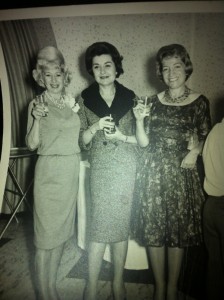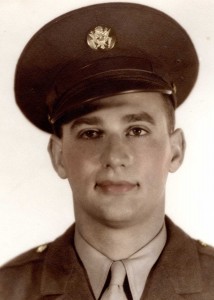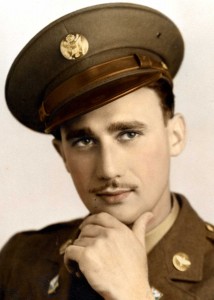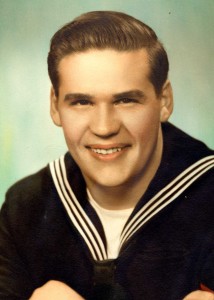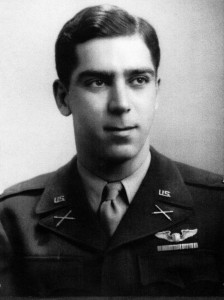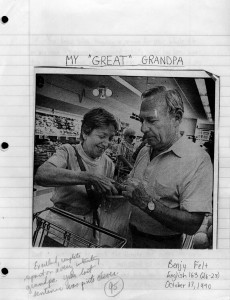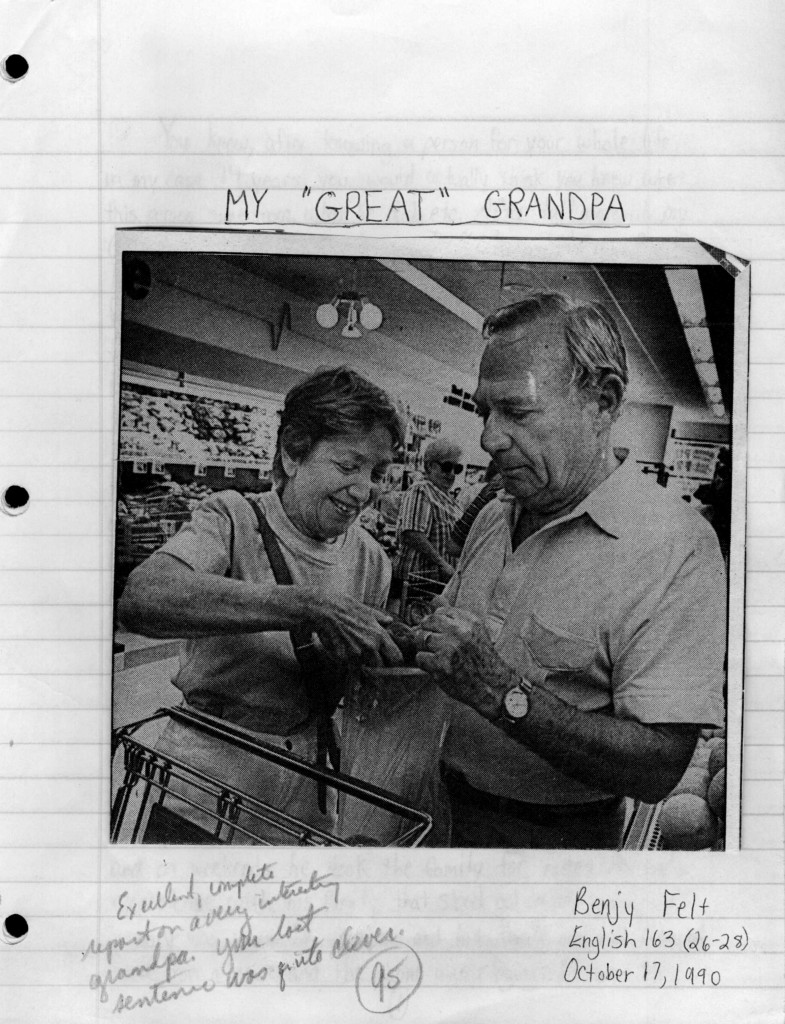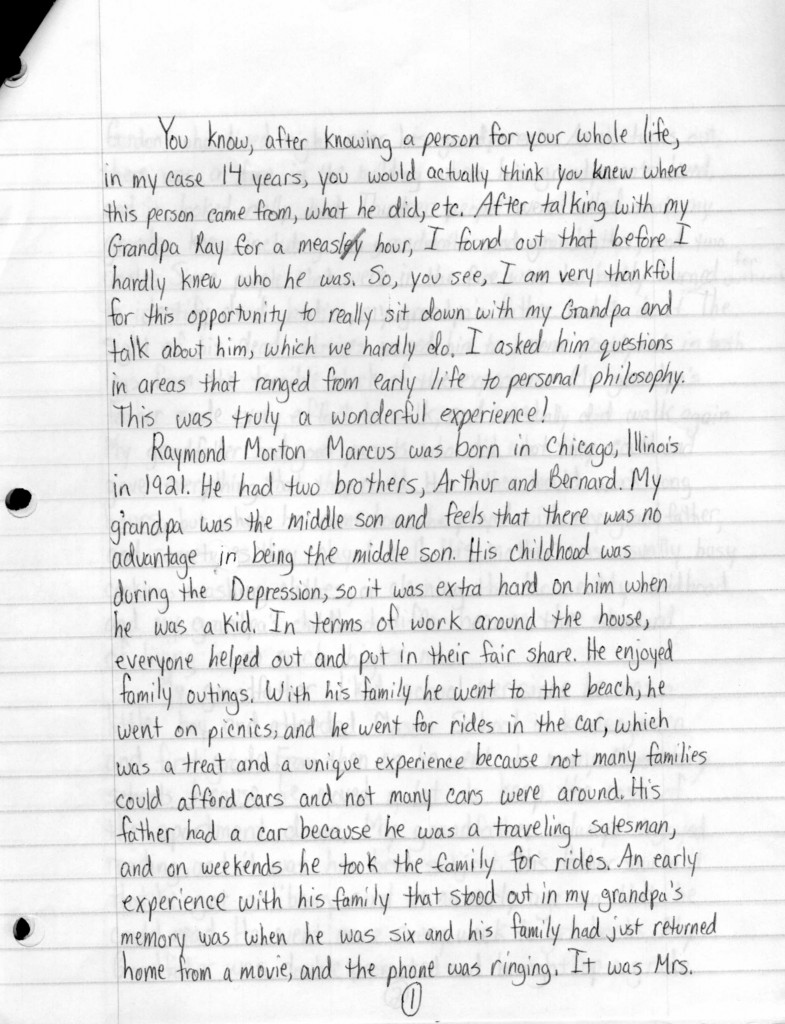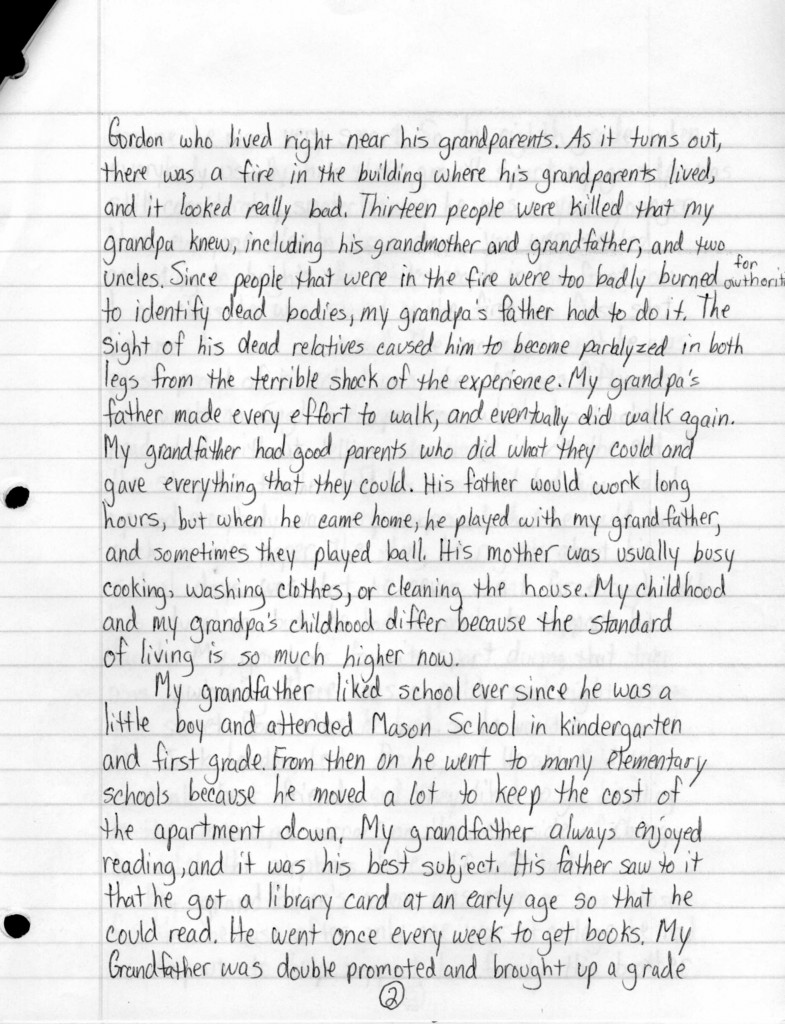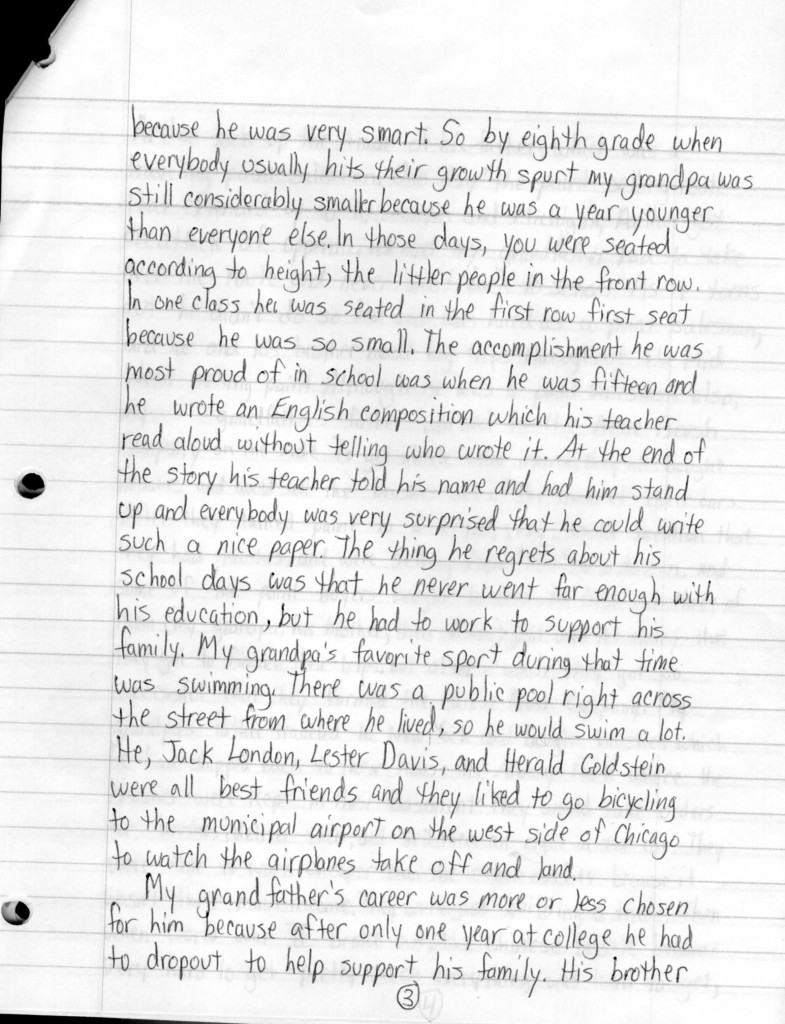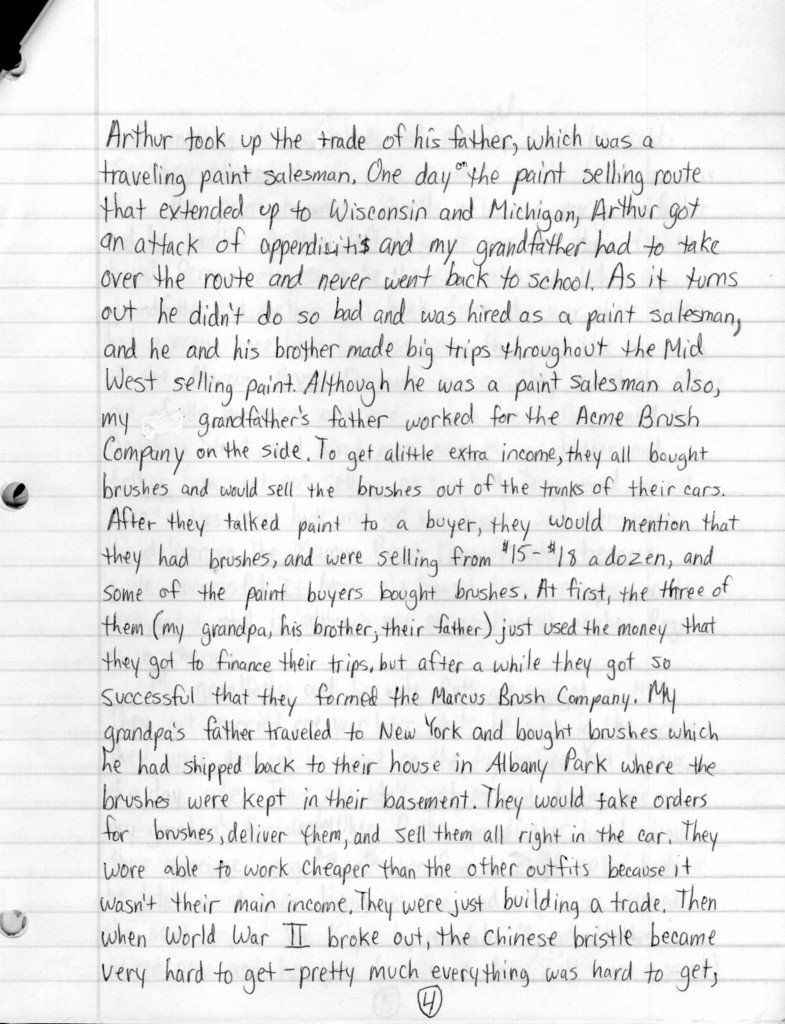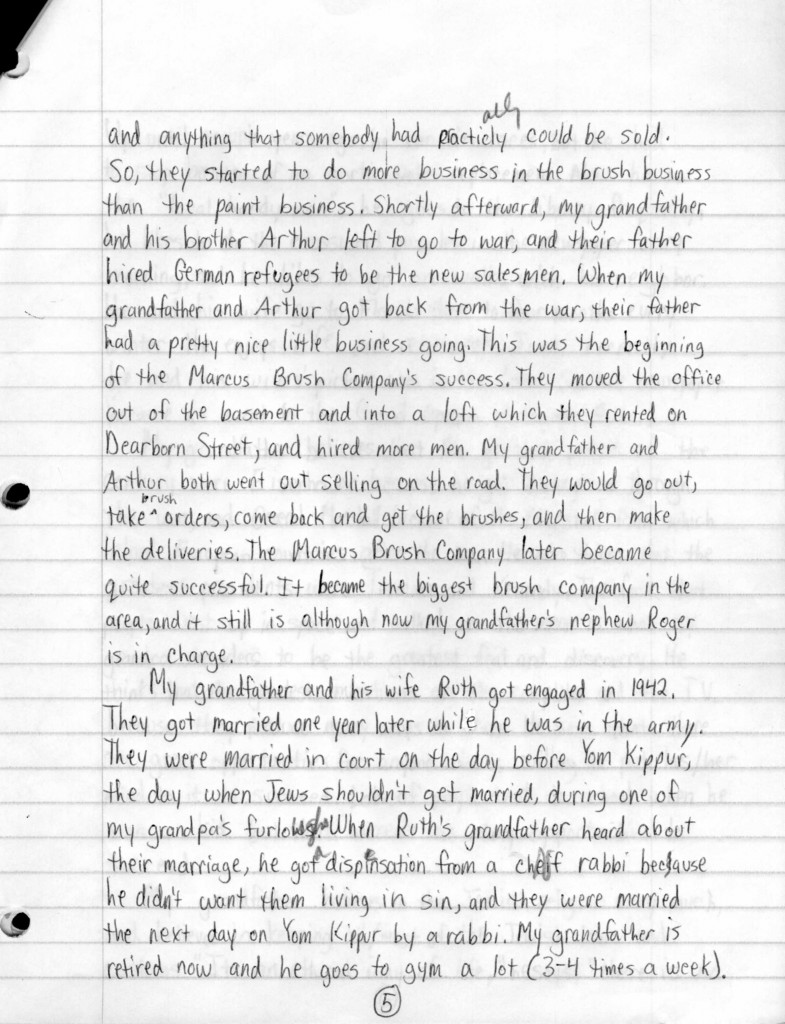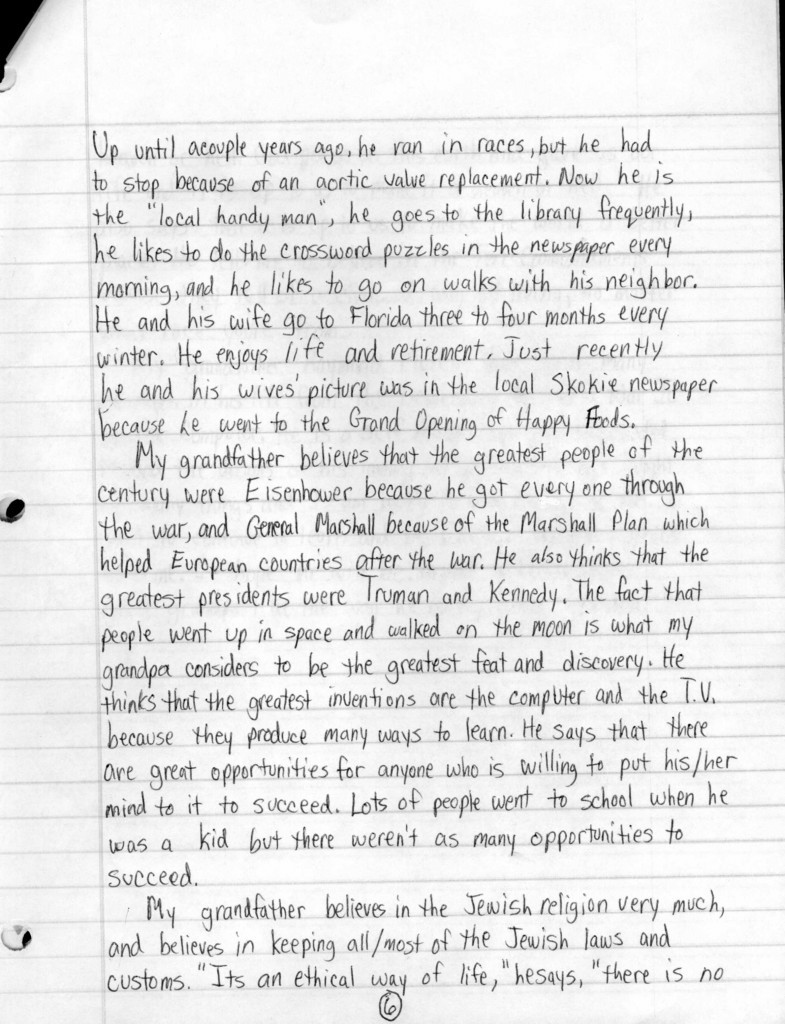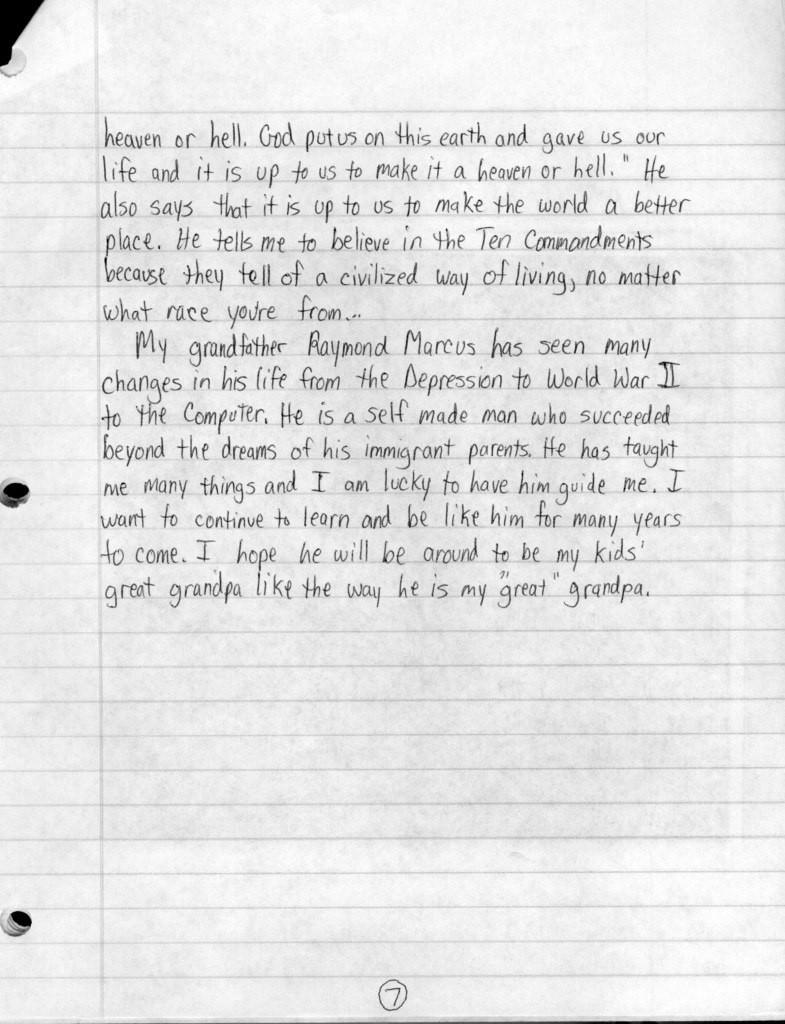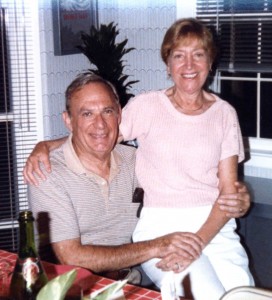Gramma Ruth, aged 91 and a half, hasn’t yet seen the last of her good life. But the end is nigh.
I’ve written extensively about my incredible grandmother, and the events that both shaped her life and describe this century’s pursuit and attainment of the American Dream. But for old time’s sake, let’s give it another whirl. Ruth’s story goes something like this…
My gramma was born in 1922 to Yiddish-speaking, Russian Jewish immigrants on Chicago’s West Side. Harry Feldman, Ruth’s father, was a barber who dreamed of real estate and slowly acquired some; Sarah Rich, Ruth’s mother, ran a luncheonette and then a delicatessan while working weekends as their apartment building’s janitor. Ruth attended Austin High School during the Depression, when teachers were “paid” by I.O.U. and Ruth’s most valuable class, taught by her most dedicated teacher, trained girls in shorthand and typing. An Honors graduate (whatever that meant, Gramma would say, since the academic regime was hardly rigorous), she began studying at a junior college. Unbeknownst to Ruth, her future husband Ray Marcus also earned high marks at Crain Technical School and enrolled in Wright Junior College. But both Ruth and Ray were forced to abandon their studies after less than a year due to the punctuated maladies of family members. For Ruth, her mother slipped on a patch of ice and broke her wrist, leaving her incapable of operating the meat slicer at the deli. For Ray, his older brother Art developed appendicitis and could not sell his shipment of Sheffield-Bronze paint door-to-door throughout the Midwest. Both families needed someone to fill in; both Ruth and Ray answered the call. And when each respective family member recovered, neither Ruth nor Ray returned to school. Rather, they continued to contribute to their family’s financial wellbeing. The two met when a mutual friend brought the lonely young paint salesman into the South Water Street deli owned by Ruth’s family.
Twenty-one-year-old Ruth married 22-year-old Ray at the dawn of World War II. He was only the second boy Ruth had ever kissed. They had been going together for about a year and enjoyed each other’s company. Had the times been different, perhaps this relationship would have been nothing more than a fling. But the times decreed that Ray was to be Ruth’s last boyfriend. Ray enlisted with the army and, despite eyesight so poor that he should have been designated 4F, Ray was accepted into the military fold. Wedding a G.I. before he shipped out overseas was framed as a girl’s patriotic duty – to refuse was considered both cruel and un-American. Still, Ruth initially resisted; unwed, Ray attended boot camp in the deep South. Then he returned to Chicago for a 15-day furlough before his dispatch to Europe, and he petitioned for Ruth’s hand repeatedly. Even Ray’s mother Gussie got on the telephone and asked Ruth why she would not marry her soldier son. On the furlough’s 12th day, Ruth finally relented. The couple went to City Hall, where a blood test was required prior to legalizing the union. The government employee successfully drew blood from Ray’s vein but could not, despite repeated attempts, find or tap Ruth’s veins. Ray offered to undergo a second draw but worried that whoever checked the blood for syphilis would notice that the two samples were identical. So they went around the corner and drew blood from the dentist on call. It was his blood that sanctioned the wedding of Ruth and Ray at City Hall on September 30, 1943.
This secular ceremony was a sacrilege to Ruth’s über-religious grandfather Jacob, so the next day he dragged the two newlyweds to the kitchen of a local rabbi, who performed the marriage rites “properly.” Ruth and Ray spent some of Ray’s remaining time together. Technically, Ray went away as a “man”; yet virtually, the husband and wife were little more than strangers.
More than two years passed before they saw each other again.
During the war, Ray encountered anti-Semitism, enjoyed camaraderie, survived injury, and witnessed horrors. Ray was assigned as a mechanic since he not only had graduated from a vocational high school but also had serviced his car during his solo treks across the desolate Plains States. (The truth was, there wasn’t much Ray couldn’t do with his hands, a fact that was made clear many years later when he carved a bust of Gramma Ruth out of a random piece of driftwood.) Yet this manual labor didn’t satisfy my ambitious grandfather. Time after time, Ray applied and was denied admission to Officer Candidate School; the only reason that seemed plausible after so many rejections was his religion. So Ray drove a truck that carried replacement parts for military vehicles, including tanks, and spent more time among his contemporaries than he ever had during his youth. Poor eyesight had kept Ray from excelling in neighborhood sports like stickball, while his traveling salesman occupation consigned him to solitude, dining alone in roadside restaurants and flopping down at fleabag motels with shared bathrooms (only on weekends did he allow himself the luxury of his own bathroom).
After some time in service, a large industrial battery fell on Ray’s foot and landed him in the infirmary. Ray recalled that a visiting officer was passing out Purple Hearts “like they were candy” but honor kept Ray from accepting a medal. He hadn’t gotten injured in the line of duty, he reasoned, and so he didn’t deserve distinction. Time passed. Ray bedded down in foxholes, ate pork for the first time, and became a pack-a-day smoker thanks to the cigarettes included in his K-rations. He drove his truck, which he cleverly named Ruthless, anywhere and everywhere his superiors commanded. That is, until D-Day + 1.
Ray didn’t like to talk about the war, and what occurred on the beaches of Normandie is probably part of the reason why. As the history books chronicle, our American boys were mowed down on D-Day; the ocean ran red and bodies – of both corpses and the agonized wounded – littered the shore. Ray was ordered off the enormous ship upon which he and Ruthless were afloat, told to follow the tanks making their way across enemy lines. To do so would mean rolling over the bodies, the thousands of bodies, mutilating their faces, crushing their limbs, entombing the dead, murdering the injured. Ray refused. It was the first and only time he opposed a direct order. He could have been court martialed. During that feverish time, he could even have been executed. But Ray would not, could not follow such a command and luckily, his life was spared. My grandpa didn’t drive off the ship until a lane was cleared and, to be honest, I’m not sure whether he assisted in clearing the bodies for it. I can’t help but think, he probably did assist with that task — who else was there to do it? Dear God…
Meanwhile, back in Chicago, my grandma was growing up in a less harrowing but no less significant way. She worked as a secretary at Sears where, like Ray, she also experienced anti-Semitism but enjoyed camaraderie. Sarah, Ruth’s whip-smart but illiterate mother, got a job at Sears too, filing forms by number. Ruth was lured away by Turner Manufacturing Company, a Jewish-owned business that both paid her more money but expected greater responsibility and provided fewer social outlets. Ruth lived with her parents (her older brother Maury, eight years her senior, had married and moved out) and delivered her wages into a family kitty; only upon her mother’s death did Ruth discover that Sarah had set aside Ruth’s salary. “All those years, she’d been saving it for me,” Ruth had confided, her voice alight with wonder. During her employ, Ruth’s bosses at Turner sent Ruth on a train trip to the East Coast, where she observed New England’s autumnal splendor and navigated glittering Manhattan.
The 21-year-old who Ray had married was not the 23-year-old to whom he returned. And obviously, the same was true of the battle-worn Ray. Together they told me candidly, as we strolled the boardwalk of Hollywood, Florida, around 1999, that had they not been bound by marriage, they would not have stayed together after the war. This honesty both impressed and devastated me. What a sad truth; what an honorable pair. And so Gramma’s loving nature never found a romantic outlet. The two were married for 67 years, until Grandpa’s death in 2010. Ruth visited him daily in the Memory Unit of their senior community — she was the only person who, through the lens of his dementia, Ray still could recognize. I remember encouraging Gramma to visit a little less and to live her own life a little more. She informed me that Grandpa was like a child and she couldn’t abandon him — “It isn’t nice, Laurel.” Yet, in an interview we conducted in 2012, Gramma couldn’t tell me the story of her “first love” – she had never fallen in love.
As a wife and stay-at-home mother during the late 1940’s, 1950’s, and 1960’s, Ruth kept house in Bud Long Woods, Highland Park, and Skokie (where she and Ray lived until 1991, at which time they sold their modest home and moved to a ranch-style townhouse in Buffalo Grove). Their first child, Barbara, was born in 1948; their second child, Richard, was born in 1952. Ruth kept their house spic-and-span — thoroughly scrubbing clothes, floors, and windows was probably her favorite aspect of housework. Cooking was probably her least favorite chore. Ruth’s mother was a gifted cook with a talent for “eyeballing” ingredient quantities and appetizingly seasoning dishes; Ruth doubted herself in the kitchen, never knowing how much of an ingredient qualified as “a pinch” and preferring her food bland. Ray’s job — both traveling door-to-door as well as managing operations at the Marcus Brush Company, the business he had inherited from his father — kept him away from home during the week and every Saturday. Sometimes on Sunday’s, the family would go for a drive. Ray’s absence was both a burden and a blessing since, temperamentally, Ruth and Ray were rarely in sync. Ruth was usually smiling and laughing, perennially upbeat and easily amused. Ray came off as distant or grouchy, perhaps put off even more than he would have been by the contrast between his own mood and his wife’s sunniness. He would retreat into crossword puzzles or yard work; at the kitchen table, he would imitate her giggles, dismiss her prattling with a wave of his hand and/or pronouncement of “Feh,” or boomingly intone, “You’re crazy, Ruth.”
Now one mustn’t think my grandpa was a monster, for he was far from it. Ray was a wounded survivor. As a young child, Ray’s mother Gussie told him that he had killed his baby brother by “loving him too much” (i.e., infecting the infant with a case of whooping cough). Gussie also suffered from the tragic loss of her parents, siblings, nieces and nephews in a raging apartment fire, which limited the extent to which Gussie could emotionally “be there” for the sensitive Ray. It’s doubtful that Ray found much comfort in the presence of his father Oscar, whose running around with their married neighbor Bea was an open secret. Immediately upon Gussie’s death in 1966, Oscar gave Bea almost all of Gussie’s possessions and promptly made her his wife. The choices that might have helped Ray find happiness — namely, career and marriage — were imposed upon him by sickness and war and, unfortunately, both ill fit the man who would emerge from the bloody conflict. Finally, Ray was bothered by his lack of high-quality schooling (which, by no means, was his fault and, in fact, indicated his honor). He would scorn his own intelligence at times, especially when we would talk of my own (hoity-toity, and enabled by his own labor and sacrifice) pursuit of multiple advanced degrees. He didn’t begrudge me my education; he was in awe of it, and judged himself harshly for barely getting any at all. It wasn’t easy being Ray. In his eulogy of his father, Ray’s son Dick stated, “The dementia that caused Dad to lose his strength, that robbed him of his talents and his wit, that caused him to even forget how to operate a fork and a spoon, that same awful dementia, also caused him to forget what he had been angry about all his life. In the end, Dad’s bitterness vanished like so much smoke.”
And that was the way it was.
In the late 1960’s, Sarah came to live with Ruth and Ray during the summers (she wintered in South Beach at the Carlyle Hotel). Sarah and Ruth were devoted to each other, despite Ruth’s perception of her own shortcomings, over which, Ruth believed, her mother despaired. Whereas Sarah had thick, curly locks, Ruth’s hair was always thin and somewhat wispy. “My mom always used to tell me, ‘Fluff it up, fluff it up!”” Ruth laughingly relates as she simultaneously recreates the gesture of hair fluffing. She routinely admires my thickish, curly hair and bemoans her own follicular fate. “If I had your hair…” she often says, and tells me how she cries over the few strands that she’s forced to sacrifice to her comb. Although nowhere near the same league as the hair issue, which reigns supreme as her number-one lamentation, Ruth also feels bad about her bust, whose size is more modest than her well-endowed mother’s had been. And finally, she rues her unadventurous palate, chuckling in retrospect at her misguided distaste for her mother’s flavorful cooking. Ruth’s self-identified limitations don’t end there. She claims to lack artistry, and so aesthetic endeavors like home decoration completely befuddle her. “I hold the pencil like this,” Ruth often says, demonstrating a shaking grip, to explain her fear of and lack of talent for writing. Among the well-educated and/or well-traveled (certainly well-monied) residents of the senior community in which she has resided since the mid-2000’s, Ruth humbly occupies a “less than” position. I’ve been led to believe, the only thing she brags about is her amazing children and grandchildren — never herself.
Certainly Ray’s years of belittling did nothing to build up Ruth’s confidence. But why was her sense of worthiness, at least in these enumerated areas, low in the first place? Why did she believe that the volume of her hair mattered a bit, let alone so very much? A small bust was made fashionable by icons like Audrey Hepburn, and certainly it matched my gramma’s slim figure. So what was the problem? And who cared if she liked spicy food or unspicy food? That’s no sign of valor. My grandpa had an ulcer for much of his life, so bland food happened to be perfect for his purposes. How limiting was it, I wonder, for her to believe she lacked any talent for creativity? Why did Gramma keep herself in that box?
Ruth actually loved music and movies and books. She ceaselessly listens to the radio, keeping up with the news or humming and dancing around the kitchen. When my mom went back to college, Ruth took a Piano Appreciation class but did not keep up with it for very long— somehow, she became unconvinced her talent. Maybe teacher told her that she’d never be a virtuoso…? But what did that matter? She was a middle-aged housewife, not gunning for Orchestra Hall. Gramma stopped taking those piano lessons and returned to the workforce, serving as the secretary to a head honcho at Sears’s new store in Northbrook Court. She left this job when she felt that she needed to care for her elderly mother. But throughout the decades, and up until quite recently, Ruth would cheerily plunk away at the keys of her upright piano (except for the brief time during the 1990’s when Gramma generously lent her piano to me, so that I might study the instrument (which I never truly did)). Music was beloved, and always a part of her.
Ruth loved stories. She went to the cinema year-round and at whatever time of day she pleased, regardless of whether the movie had already started. She would remain in the theater until she’d seen every part of the film, be it from beginning to end or from middle to middle. She told us conventional grandkids that this habit was a throwback from her younger days, when moviegoers would always get a newsreel and a cartoon, etc, for their nickel’s admission. Ruth loves black-and-white films and, since she never used to sleep much, getting the Turner Classic Movie channel via cable totally changed her life for the better. Gramma has always enjoyed reading too, even maintaining Grandpa’s subscription to the Library of Congress’s “book-on-tape” program for the visually impaired long after he lacked the capacity to attend to its tales, and even after Grandpa passed away. All of this suggests a feeling for art if I ever saw one.
And is there any finer or more challenging a practice than the art of conversation? Ruth can and does talk with everybody. My uncle, her son Dick, told me with reverence that his mother retains the stories of CEO’s and chambermaids, and holds them all (both the stories and their tellers) in equal esteem. Never will you meet a more personable and joyous old lady, made all the more charming for her advancement in years. She laughs and smiles, touches busboys on the forearm, pats random children on the head, and sees people. Domestics are not invisible to Ruth — she greets them as easily and as regularly as her aged neighbors. She knows the names of her waiters’ children, and the doctor son of the woman at the bank (who she used to visit often since Ruth insists on giving the grandkids “a few bucks” every time she sees us). The employees at The Corner Bakery start cooking her scrambled eggs (which aren’t even on the menu) as soon as they lay eyes on Gramma, and the staff at Georgie V’s whip up her regular order (and my mom’s and my uncle’s) within moments of her settling down in a booth. Whenever I identify myself to the front desk staff at Gramma’s building as Ruth Marcus’s granddaughter, their knowing and appreciative “Oh” informs me that Gramma is special to them too.
Gramma twinkles. Her joie de vivre is exceptional, unflagging, infectious. She gives everyone the benefit of the doubt and describes most people as “dear” — except for those who embattle the lives of her loved ones. “Don’t let ‘em push you around,” Ruth habitually tells us grandchildren, the youngest of whom is 25 years old. “Tell ‘em your gramma will get ‘em,” she instructs. We all agree: No we won’t; yes we will. “Keep the faith, baby,” Gramma also tells us. And she thanks us for calling, with a genuineness and humility that could break your heart. “Of course, Gramma,” we say.
She tells me that I’m special, so special, and everyone who surrounds me, particularly my fiancé, better know that. He knows, I assure her. “There’s no one in the whole world like Laurel,” she tells me, and won’t hear any protestations to the contrary, will not accept that among my contemporaries, I’m only maybe above average. “If you knew what it was like to live life like the rest of us…” she tells me. For the past few years, at the end of every phone conversation, I tell her I love her. She used to laugh at this, I think because such a sentiment is obvious and such words are inadequate for expressing the magnitude of our feeling. She would tell me, “I love you more,” and I would permit her this one-up. But now she tells me first, “I love you” or replies, “I love you too.” Maybe this is an indication of her complete assimilation — I once read a book entitled I Love You’s Are For White People. Or maybe Gramma knows that, at any time, this might be her last chance to let me know, unmistakably, how she feels. We know; we both know. But we still say it.
My great-grandmother Sarah passed away when I was one year old, so I never really knew her. I know she was an incredibly strong woman, and I know that my gramma still adores her, still misses her. I try not to begrudge Sarah for the hang-ups that her daughter acquired and retained throughout her life; the times were different, and so were parenting philosophies. I know that Sarah did her best. Consistently since 1981, Gramma has visited with her dear, departed mother. Sarah appears in Gramma’s dreams; they often sit side-by-side on a bench facing the ocean in Florida. They chat. It gives me immeasurable comfort that soon, Gramma will be with her mother.
I also gladly comfort in the fact that Sarah will fetch Ruth and shepherd her to the other side. After all, Gramma’s family has a long, well-documented history of spirit-assisted crossing over.
One evening during the late 1970’s, Sarah found herself alone in South Beach, without a phone, and feeling quite poorly. Certain that she would die that night, Sarah laid out various paraphernalia on her dresser so that whoever discovered her body would be able to identify her and call her daughter Ruth. When she went to sleep, she dreamed. She was seated at a dining table with her husband Harry (d. 1959) and son Maury (d. 1961). When the men finally got up to go, Sarah rose to join them. “No,” they told her. “It isn’t your time yet.” Sarah awoke the next day feeling much better, and later visited a doctor. He contended that Sarah had suffered a minor heart attack yet recovered.
By February 1, 1982, Sarah had been living full-time with Ruth and Ray for quite a while. She awoke that morning and informed Gramma, my mom, and anyone who would listen that her deceased husband Harry was coming for her. Sarah dedicated that day to saying her goodbyes, even driving out to Glenview with Ruth to bid farewell to Barbara (and baby Laurel). Before going to sleep that evening, she walked slow through the house, looking, looking, looking for Harry. Everyone dismissed her behavior as dementia — after all, the 90-year-old Sarah had wandered off recently and been unable to find her way home. Once, Sarah had convinced herself that Ruth was her landlady, and this landlady was licentiously sleeping with some strange man (who, in fact, was Ray). Sarah refused to speak to Ruth for an entire day — “You know what you did!” she had told my blameless “strumpet” grandmother. But on this day in February, it seems that Sarah was lucid. In the dead of the night, Sarah arose from her bed and, without the aid of her glasses, dentures, or walker, she made her way through the dark house, descended the stairs, undid the multiple deadbolts on the front door, and experienced a massive heart attack before falling dead upon the snowy lawn.
In 1988, my mom feared for her life; a malady from which she was suffering might be a brain tumor, and she was on pins and needles waiting for the results. During that time, she had a dream. Her grandmother Sarah, her grandmother Gussie, and her uncle Maury appeared at her bedside and told her that it wasn’t her time yet. Indeed, my mom was cancer-free.
In the 1990’s, Sarah’s youngest sister Ethel was facing her final days. Ruth and Ray would attend to her during the day, while a nurse would accompany her overnight. My grandpa told me that she used to cry out in her sleep, “No Maury, I’m not ready yet!” He explained that Ethel’s financial affairs were not in order. With an accountant, Ray helped to settle Ethel’s estate. And when the task was completed, Ethel awoke one morning and announced that Maury was coming for her. She went to bed that night and neither did she stir nor ever wake up.
A few weeks ago, my mom had a dream. In the dream, she was at the grocery store with her Uncle Art, Ray’s older brother. He assured her, “Everything will be okay.”
It seems that my gramma believes this too. When a hospice social worker asked Ruth last week if she understood what was going on, Ruth said yes. “I’ve had a good, long life,” she said. “And nobody lives forever.” Yesterday, she abruptly awoke from a nap and told my cousin Joe, “I’ve still got some time left.” But the end is nigh. Today, after Ruth woke up, my mom asked if she had been dreaming. “Of course!” Ruth laughingly replied. I think that Gramma was dreaming of her mother, in fact was with her mother, on that bench outside the Carlyle Hotel.
Tonight I sat with my gramma. She’s faded, and fading, and oh-so-skinny, but the words she can muster definitively prove that she’s still herself. We’re blessed by that fact; my grandpa was dead years before he died. When I announced my arrival over Gramma’s bedside, she smiled happily and accepted my kisses. Later in the evening, when I asked her if she’d ever seen Meet John Doe, the Barbara Stanwyck-Gary Cooper movie we were all watching on the TV in her bedroom, Gramma murmured, “It sounds so familiar…”
We left Gramma in the care of Elizabeth, her sweet night nurse, and promised to return for breakfast. “Okay,” Gramma agreed. I believe we’ll reunite in the morning. But maybe we won’t.
“I’ve had a good life,” Ruth said. According to developmental psychologist Erik Erikson, the imperative that people face in their life’s final chapter is Integrity vs. Despair. Either they make peace with the life they have lived, with the way things have gone and the legacy they leave behind, or they bitterly wonder, “Is that all I get? What was it for?”
If I could, I would have eased my grandpa’s burdens, which perhaps would have made him a happier man and a better mate for my gramma, the one into whose arms she might have fallen, lovestruck. I would have helped my gramma to believe in her own specialness and revel in her beauty, both outer and inner. But Ruth herself admits few, if any, regrets. She has said that, had she known how much she would enjoy her grandkids, she would have had more children. I know that she would have loved to have lived part of her later life amid the hustle and bustle of downtown… But overall, she’s made peace; she’s prepared; she’s peaceful.
“I’ve had a good life.”
I’ll be with my gramma until the end. And I know that she’ll be with me afterwards.
- Transcripts from interviews with Ruth Feldman Marcus, Barbara Marcus Felt, and notes from a talk with Raymond Marcus
- Essay produced from these interviews and notes
- Eulogies of Raymond Marcus
- An essay about Raymond Marcus, written by my then 14-year-old brother
- WWII accounts of Raymond Marcus, Arthur Marcus, Bernard Marcus, and Charles Milner
- Stories about my paternal grandparents
- Saying goodbye
- Transitioning
- Tolerating ambiguity
- Slip Slidin’ Away


